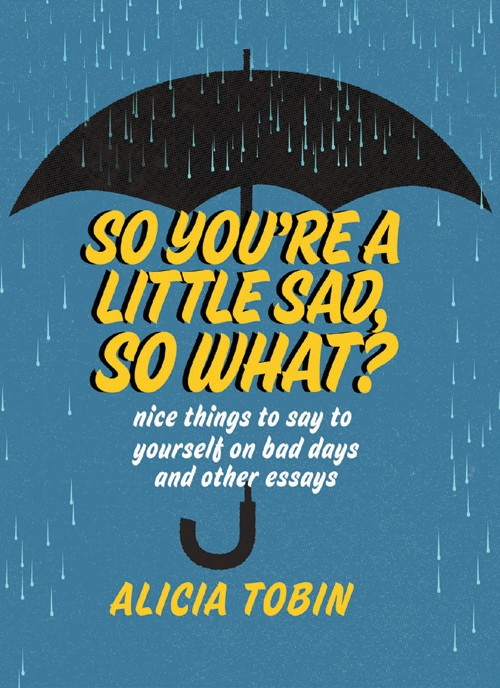So You’re a Little Sad, So What?: Nice Things to Say to Yourself on Bad Days and Other Essays by Alicia Tobin
So You’re a Little Sad, So What?: Nice Things to Say to Yourself on Bad Days and Other Essays
by Alicia Tobin
Robin’s Egg Books, an imprint of arsenal Pulp Press, 2019; 160 pages; $17.95
Review by Jessica Key
“Not only do raccoons have collapsible spines and deadly poop, but they also have amazing hands. Paws? Haws. Hand-paws. Oof did I just have a stroke?”
Alicia Tobin loves (and fears) raccoons. She also rescues pigeons. She knows food. And it’s hard not to approach a review of her first essay collection without some bias, because in non-pandemic times her comedy show “Come Draw with Me” is one of the greatest delights of living in Vancouver. Luckily, however, this book exactly lives up to the humour her audiences have come to expect — it’s charming and self-deprecating, balances social commentary and melancholy, and even when she’s making fun of you, you always feel like you’re in on the joke.
Tobin’s writing is approachable — each essay feels like an anecdote delivered over a pint at the bar, but from the friend that everyone actually wants to dominate the conversation. Better yet, her frankness and easy wit give both her and her readers the space to explore more difficult topics, including mental health, familial relationships, chronic pain, toxic work environments, and body image. Sometimes when reading funny essay collections, it can feel as though the writer is using their humour to deflect from their emotions. Tobin, instead, uses it as a way to meaningfully engage with them.
Many of the feelings expressed in the book are (sometimes unbearingly) relatable, even when the anecdotes are not. For example, I never joyfully performed “Like a Virgin” in elementary school, horrifying parents. But her frank explanations of struggling with self-esteem, are infinitely relatable:
“The part of me that hurts the most is the part that doesn’t know I am any good. or worth very much. That is the part that hurts the most when I hurt. The other part that hurts is my stomach because when I am upset, I eat so many cookies, you have no idea.”
There truly isn’t a weak essay in the entire collection. It keeps up its velocity, vulnerability, and barbed wit from beginning to end. In life, sometimes the line between laughing and crying feels perilously thin, and this collection straddles that line effortlessly. Tobin is continually gentle and kind, but also unflinchingly honest — with her exes, with her mother, with herself, and this also feels like it extends to you as the reader.
This book made me want to cuddle my dog, thank my landlord, tell all the toxic men in my life to go fuck themselves, weep, laugh, and buy things. But, most of all, when I think of this collection, I return to the author’s own words: “all of this beauty kept seeping into my hardest and saddest places . . . like a fancy thong on a sunburnt butt.”

